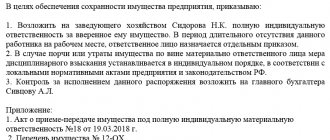The employee is responsible for the money and goods with which he works. To consolidate the obligation on paper, agreements on full financial liability are concluded.
They will come in handy if there is arrears and the employee refuses to pay.
If you prefer legal language, follow the links below, and we will try to explain everything in simple words.
Chapter 39 of the Labor Code of the Russian Federation
Resolution of the Ministry of Labor of the Russian Federation dated December 31, 2002 No. 85
Resolution of the Plenum of the Armed Forces of the Russian Federation dated March 17, 2004 No. 2
Review of court practice on financial liability of employees dated December 5, 2018.
Why do you need an agreement on full financial responsibility of the employee?
Employees are responsible for damage even without a contract. If a person gets a job, he is obliged not to cause harm and to be attentive according to Art. 232 Labor Code of the Russian Federation.
This is limited liability. Limited - because the employee is responsible within the limits of average earnings under Art. 241 Labor Code of the Russian Federation. If he destroys a company car worth 1 million, you can only ask him for a small part of the amount.
The master spilled glue on ten rolls of designer wallpaper. The wallpaper cost 30,000 rubles, and the master’s salary was 20,000 rubles. This means that the employer will pay 10,000 rubles from his own pocket.
In Art. 243 of the Labor Code of the Russian Federation there are exceptions. If an employee caused damage while drunk, acted out or stole, he still pays the full amount. But another problem arises: to prove that he was really drunk or that it was he who stole.
According to the contract, the employee pays in full
The agreement on financial liability removes the restrictions of the Labor Code. The employee compensates for as much damage as he caused, without reducing the amount to the amount of one salary.
Limits of liability
An employee's financial liability can be limited or full.
The limits of an employee’s financial liability are established by Article 241 of the Labor Code of the Russian Federation and are limited by the amount of his average monthly earnings, unless otherwise provided by the Labor Code of the Russian Federation or other federal laws. What does this mean in practice?
If the amount of damage exceeds the employee’s average monthly earnings, then the employee is obliged to compensate only that part of it that is equal to his average monthly earnings (for example, decision of the Venevsky District Court dated May 28, 2018 No. 2-168/2018).
At the same time, the rule on limited financial liability of an employee within the limits of his average monthly earnings is applied in all cases, except for those in respect of which the Labor Code of the Russian Federation or other federal law directly establishes a higher financial liability of the employee, in particular full financial liability.
Full financial liability for the full amount of damage caused is assigned to the employee in certain cases (Article 243 of the Labor Code of the Russian Federation). For example, when an employee is charged with financial liability in full for damage caused to the employer during the performance of the employee’s job duties, intentional infliction of damage, causing damage while under the influence of alcohol, drugs or other toxic substances, as a result of the employee’s criminal actions established by a court verdict, as a result administrative violation, if established by the relevant government body (clause 4 of the Resolution of the Plenum of the Armed Forces of the Russian Federation dated November 16, 2006 No. 52, letter of the Rostrud of the Russian Federation dated October 19, 2006 No. 1746-6-1).
That is, with full financial liability, the employee must fully compensate the company for the entire amount of damage caused (Articles 242 and 243 of the Labor Code of the Russian Federation).
Termination of an employment contract after damage has been caused by a former employee does not entail his release from financial liability. By law, the employee is obliged to compensate the employer for direct actual damage caused to him (Article 238 of the Labor Code of the Russian Federation). In this case, lost income (lost profits) cannot be recovered from the employee.
General limitations on full liability
Of course, the employer does not recover damages absolutely freely. There are still restrictions, this is stated in the Review of Court Practice dated December 5, 2018.
Real damage
The employee only pays for actual damage to the employer - Art. 238 Labor Code of the Russian Federation. This is a lack of money, spoilage of food, theft, payments for customer claims or fines from government agencies. Lost profits cannot be recovered from an employee.
The courier lost tablets worth 100,000 rubles, which he was delivering to a client. The employer had to order new ones and cancel the planned purchase for another 500,000 rubles. The disappearance of tablets is real damage, and the employee is responsible for it. A failed order and subsequent sales are lost profits that the employee should not compensate.
Reduction of the amount by the court
The court has the right to reduce the employee's debt. It takes into account what the employee's salary is and whether anyone else was at fault for the damage. An exception is if a person committed a crime: he stole money or organized the sale of goods to a third party. Then the amount cannot be reduced according to 250 Labor Code of the Russian Federation.
The court does not give a discount to everyone. Whether it will happen depends on the skill of the worker during the process.
Employee's fault
You cannot take money from an employee if he is not guilty - Art. 233 Labor Code of the Russian Federation. The employee is not responsible for force majeure events such as flood, fire and robbery. He doesn't keep track of goods during someone else's shift or at night. All similar circumstances are listed in Art. 239 Labor Code of the Russian Federation.
Submit reports without accounting knowledge
Elba is suitable for individual entrepreneurs and LLCs with employees. The service will prepare all the necessary reporting, calculate salaries, taxes and contributions, and generate payments.
Try 30 days free Gift for new entrepreneurs
With whom do they conclude agreements on full financial liability?
Three conditions must be met:
— The person is 18 years old;
— He works directly with money and goods. Directly means he takes money in his hands, stands behind the counter with goods, or delivers orders.
— The position or work performed is listed in Resolution of the Ministry of Labor of the Russian Federation dated December 31, 2002 No. 85. Therefore, it is important to correctly name the position in the staffing table and employment contract.
Popular positions from the list:
- cashier;
- administrator in trade, catering, hotels;
- salesman;
- merchandiser;
- master of construction and installation works;
- Warehouse Manager;
- storekeeper;
- forwarder.
Popular works:
- accepting payments;
- release of goods and services;
- release of material assets from the warehouse;
- cargo delivery.
If there is no suitable position or work in the list, full responsibility cannot be registered. For example, the Ministry of Labor does not mention security guards. The agreement with them has no legal force.
The director and chief accountant are not on the list, but they also bear full responsibility. You just need to include a clause in the employment contract - Art. 243 Labor Code of the Russian Federation.
If the employee is against the contract
People don't like to take unnecessary risks. But employees are required to sign an agreement on full financial responsibility if they primarily work with money or goods, and the position is included in the list of the Ministry of Labor. For rioting, you can be reprimanded and even fired, which was allowed by the Plenum of the Armed Forces of the Russian Federation in paragraph 36 of Resolution No. 2 of March 17, 2004.
Article about employee responsibility
What is full collective liability?
Financial liability is the obligation of a party to an employment agreement (in most cases it applies to employees) to compensate the other for damages. The concept of “collective” means that the provisions of the agreement apply immediately to the entire team of employees. Accordingly, if damage is caused to the organization’s property, the damage will be recovered from each employee appearing in the document.
The full type obligation implies that employees must pay full compensation for the harm caused.
IMPORTANT! According to the concluded agreement, the manager can only recover actual losses. This does not apply to profits lost as a result of damage.
In what cases is a contract necessary?
According to the provisions of Article 244 of the Labor Code, an organization has the right to draw up an agreement on the incurrence of obligations for monetary damage with a team group of workers in the event that this cannot be done with a specific person due to the impossibility of delimiting obligations.
In addition, when drawing up an agreement on collective responsibility, you need to take into account that it can only be concluded with citizens holding certain positions.
Complete list in accordance with regulation No. 85 of the Ministry of Labor Regulations.
Cashiers, controllers, cashier-controllers (including senior ones), as well as other employees performing the duties of cashiers (controllers).
Managers, their deputies, specialists and other employees engaged in: depository activities; examination, authentication and other verification, as well as destruction in the prescribed manner of banknotes, securities issued by a credit or other financial organization and / or the Ministry of Finance of Russia; transactions for the purchase, sale, permission to pay and other forms and types of circulation of banknotes, securities, precious metals, coins made of precious metals and other currency values; cash transactions when servicing ATMs and servicing clients who have individual safes in the vault, accounting and storage of valuables and other property of clients in the vault; operations for the issue, accounting, storage, issuance and destruction of bank, credit, discount cards, cash and other financial services to customers, for counting, recalculating or generating cash and currency values; collection functions and transportation (transportation) of cash and other valuables (including collection drivers), as well as other employees performing similar functions.
Directors, managers, administrators (including senior, chief), other heads of organizations and departments (including sections, reception areas, points, departments, halls) of trade, catering, consumer services, hotels (camping sites, motels), their deputies , assistants, sellers, commodity experts of all specializations (including senior, chief), as well as other employees performing similar functions; heads (managers) of construction and installation shops, sites and other construction and installation departments, work producers and foremen (including senior, chief) of construction and installation work.
Managers, other managers of warehouses, storerooms (points, departments), pawnshops, storage rooms, other organizations and divisions for the procurement, transportation, storage, accounting and issuance of material assets, their deputies; managers of households, commandants of buildings and other structures, storekeepers, wardrobe maids; senior nurses of healthcare organizations; procurement and/or supply agents, freight forwarders and other workers who receive, procure, store, record, issue and transport material assets.
Managers and other managers of pharmacy and other pharmaceutical organizations, departments, points and other divisions, their deputies, pharmacists, technologists, pharmacists.
Laboratory assistants, methodologists of departments, dean's offices, heads of library sectors.
For example, these could be warehouse employees, since their duties satisfy the conditions specified in this document, namely: production, storage, accounting, reception and issuance of material assets.
Who can you enter into an agreement with?
In accordance with current regulations, agreements on full collective financial responsibility can be concluded with all citizens, with the exception of:
- working in small retail outlets;
- workers on a part-time or weekly work schedule, provided that their main duties do not involve working with financial assets;
- auxiliary positions;
- junior service personnel;
- those who do not have experience working with material assets.
At the same time, there are some clarifications regarding teams of employees working in warehouses or sales areas where financial assets are located. A full liability agreement is concluded with them only if the following conditions are met:
- a specific room is used by one team of workers;
- transactions carried out with funds and valuable objects are included in one workflow algorithm.
The conditions noted above are stated in the order of the Ministry of Trade of the former USSR under number 169. This document is still valid today.
You may be interested in : How does the dismissal of a financially responsible person occur?
Features of concluding a contract
When developing a document, it is necessary to comply with the requirements for its content. In particular, this applies to the section on management issues. It must contain the following information:
- rules for observing the principles of voluntariness in the matter of team formation;
- information about the employee who will be entrusted with the powers of the boss, as well as about the employee who assumes responsibilities in his absence;
- provision on the need to re-register the document if more than half of the composition of the team members changes.
IMPORTANT! The algorithm for making and accepting adjustments to the provisions of the document without re-issuing it must be specified in the agreement. Otherwise, changes in the structure of the team’s work will result in the current version of the document being invalid.
How to draw up a full liability agreement
Agreements on financial liability can be individual or collective (team).
Collective - when people work together and it is impossible to know who to ask. For example, there are three people working in a warehouse. The entrepreneur carried out a monthly inventory and discovered that 5 boxes of shoes were missing. Each employee will pay a third.
Under the collective agreement there is a presumption of guilt. By default, the employee is guilty, but he can prove the opposite - Art. 245 Labor Code of the Russian Federation. For example, he did not enter the warehouse for a whole month, and during the last inventory the shoes were still there. Then there is nothing to collect money for.
How to introduce collective responsibility:
- Issue an order.
— Ask employees to sign an agreement (standard form).
— Appoint a “brigade” leader.
Example: how liability agreements helped in court
An entrepreneur hired two salespeople for a clothing store. He drew up employment contracts and an agreement on collective financial responsibility.
One day, an entrepreneur noticed that there was too little money in the online cash register. The inventory showed that 62,880 rubles were missing. The sellers were supposed to pay the shortfall, but they refused.
Then there was a long dispute with a statement to the police, a trial and accusations of bias on the inventory commission. But in the end, the court said that clothing sellers are fully responsible for the cash register, and the inventory is in order. You will have to pay 32,483 ₽.
Case No. 33-4711/2019
Standard form of an agreement on full individual liability
Standard form of an agreement on full collective liability
The goods and money are transferred to the employee according to the act or an inventory is taken before the start of work.
Employee categories
The question arises: what kind of specialists fall into the category of servicing or using monetary, commodity values or other property? What work must be done to be subject to full financial liability under the relevant agreement? The answer to these questions is contained in Part 2 of Article 244 of the Labor Code. According to the norm, lists of works and categories of employees with whom such contracts can be concluded, as well as standard forms of these contracts, are approved in the manner established by the Government of the Russian Federation (see Resolution of the Ministry of Labor of the Russian Federation of December 31, 2002 No. 85 “On approval of lists of positions and works, replaced or performed by employees with whom the employer can enter into written agreements on full individual or collective (team) financial responsibility, as well as standard forms of agreements on full financial responsibility”).
The Resolution specifies positions (for example, cashiers, controllers, collectors) and work (for example, work on accepting and paying all types of payments; settlements for the sale (sale) of goods, products and services), replaced or performed by employees with whom there may be written agreements have been concluded on full individual financial responsibility for shortages of entrusted property, as well as standard forms of relevant agreements.
note
The Labor Code defines two types of financial liability of employees - limited and full. In accordance with Part 2 of Article 242 of the Labor Code of the Russian Federation, as a general rule, the principle of limited financial liability applies, but full liability can be brought only in cases established by law.
A certain problem is the issue of judicial interpretation of the provisions of the Resolution regarding whether the employee’s duties fall under this or that work specified in the announced document. The answer to this question determines the possibility of bringing a specialist to full financial liability (a striking example illustrating this problem is the appeal ruling of the Altai Regional Court dated September 7, 2021 in case No. 33-9710/2016).
How to recover damages from an employee
The main rule for collecting damages from employees is to follow the Labor Code. The rules are spelled out in Art. 246, 247 and 248. If you do not comply with them or do not draw up documents at all, the court will cancel the penalty, and the Labor Inspectorate will fine you under 5.27 of the Administrative Code.
Here we will tell you the general procedure, and read the article for details.
— Assemble an independent commission.
— Take an inventory with her and calculate the loss.
— Get an explanation from the employee.
— Issue an order to deduct from wages.
— If the employee agrees to pay immediately or more than 20% of the salary, make an agreement on compensation.
— If an employee refuses to pay, go to court.
The shortage was discovered after the employee was fired
Dismissal does not relieve the employee of responsibility. You can recover damages even if the person no longer works for you - Art. 232 of the Civil Code of the Russian Federation. The problem is that the employee can hide and then challenge the amount in court. It’s easy to insure yourself: take an inventory before each dismissal.
Errors in full liability agreements
A large amount of judicial practice has already developed under these agreements. We have analyzed it and will tell you about the popular mistakes made by employers.
The employee did not participate in the inventory
An employee cannot be found guilty without explanation. The employer must familiarize him with the commission’s conclusion and give him the opportunity to speak out. Otherwise it will turn out to be biased. The court will cancel the penalty, following the Review of Court Practice dated December 5, 2018.
The position is not on the list, but the contract was concluded
You shouldn't rely on intuition. Even if you are sure that the employee must bear full financial responsibility, check the list of the Ministry of Labor. If there is no suitable clause, there is no agreement.
A car mechanic changed the oil on a client's car. He did not tighten the drain plug properly and over time the oil spilled out. The car stopped in the middle of the road because the engine stopped. The car service admitted its guilt and compensated the driver for the costs of calling a tow truck and repairs. And then he began to deal with the employee.
The car mechanic signed an agreement on full financial liability. The entrepreneur filled out the documents and went to court. The court said: neither the position of a mechanic nor car repair work is on the list of the Ministry of Labor. The contract is illegal, so the employee is liable within the limits of his monthly salary.
Case No. 33-4390/2015.
If your employee works with expensive goods, formalize the receipt with one-time documents - deeds and powers of attorney. Then responsibility will also be full under Art. 243 Labor Code of the Russian Federation.





